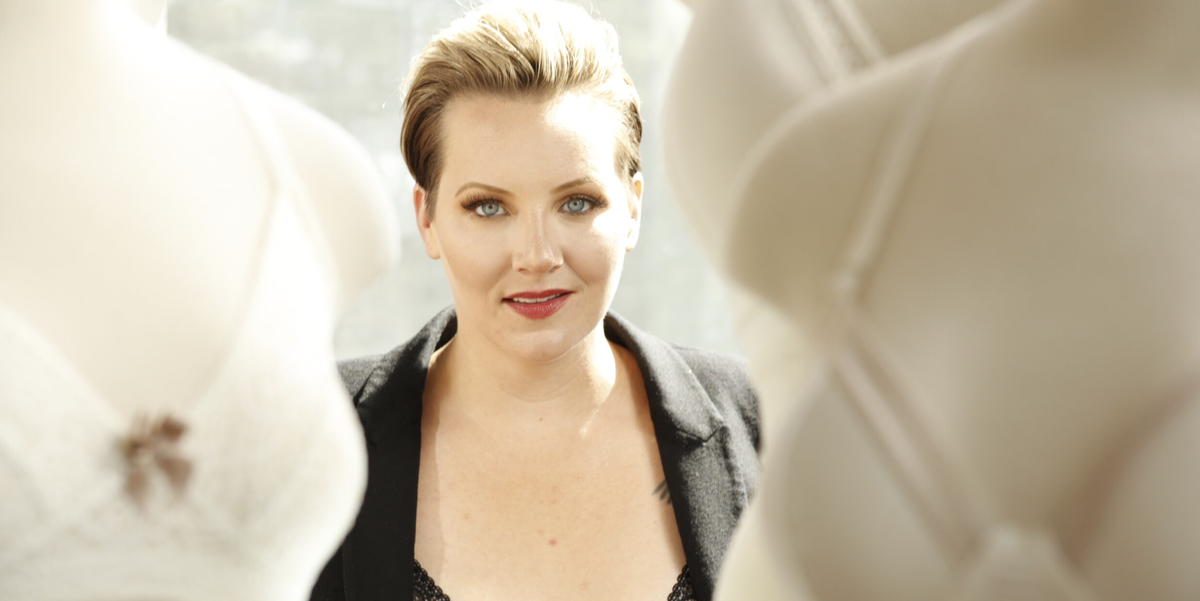Products You May Like
It’s a morning like any other on the Lower East Side of Manhattan. At the crammed outdoor cafés, boozy brunch cocktails slosh onto the sidewalk, clutched by young women with nail art and crop tops who seem to be in a perpetual gossip download. As whispers of Timothée Chalamet sightings and Hinge ghosts creep down Orchard Street, a roar of joyous applause erupts from behind the doors of a crumbling gothic church. It sounds a little like thunder and a lot like a party, and it momentarily stops the chatting klatch outside.
The noise hails from none other than Dana Donofree, a longtime fashion industry executive and the founder of AnaOno, a lingerie company she created after a breast cancer diagnosis at age 27 changed the way she viewed her body—and her clothes. “After removing both my breasts to treat my disease and reconstructing them, I found that ‘regular’ intimates no longer fit,” she explains. “What was available to me instead were these awful, ugly, matronly bras. I knew that we could do better! Women undergoing cancer treatment are already dealing with so much. They don’t also need to deal with hating their clothes. So I started figuring out a solution.”
That solution began with bras and underwear built for women in various stages of breast cancer recovery, including those with mastectomies, implants, unilateral removals, and recent surgery. They now make over 20 styles, spanning from lacy lingerie to sleek activewear, with sizing that goes up to a 3X. “Something I’ll never compromise on is absolute inclusion,” she says, “whether you have two breasts, one breast, no breasts, or new breasts…we’ll make it work for all of it.”
In 2017, AnaOno staged its first runway show—a collaboration with Eisai and Cancer Culture titled “The Revolution for Pink”—at New York Fashion Week and sold tickets to benefit breast cancer research and recovery. But even though Donofree built the event as an empowering and optimistic celebration of her community, she had one big rule: this show was not meant to be solely inspirational.
“As a survivor myself for 13 years, I can say that there have been times when I’ve been really mad at the ‘pinkwashing’ of breast cancer awareness,” she sighs. “It felt very exploitive to me, you know, to have your pain and ‘resilience’ put in a marketing campaign!” (Cue the scene from Sex and the City when Samantha Jones boldly declares, “Fuck it,” and takes off her wig while speaking onstage at a breast cancer fundraising luncheon.)
Donofree continues: “But I didn’t want to abandon the use of pink altogether, because breast cancer research and awareness saves lives. If we can impact research and find more ways to treat this disease, we can get more time with the ones we love. And if we can impact awareness, we can ensure people get diagnosed as fast as possible, which leads to many more treatment options.” (Or, as AnaOno runway model Caileigh Scott says, “It’s time to take back pink!”)
This year’s runway show promised a $25,000 donation to the Breast Cancer Research Foundation, with a bigger goal of $50,000. Just as important, Donofree says, is ensuring people make a link between the clothes they’re wearing and the health of their bodies.
“We’re finally awakening to the fact that cancer and disease is an issue that’s linked to pollution and environmental damage,” she says. “Our air, our food, our clothing—all of these things are linked. Fashion as a whole needs to accept responsibility to create a better earth and healthier humans, because what touches your skin gets absorbed by your skin. Using quality fabric matters a lot to me, and to other fashion designers. And it also matters greatly to cancer patients. So, you know, it’s not just better bras…it’s a better life!”
To learn more about breast research and recovery, visit BCRF.

Editor at Large, ELLE.com
“Her beauty and her brain go not together.” —William Shakespeare

